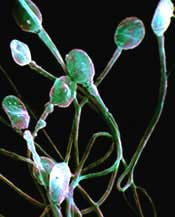Unisex contraceptive tailed

Channel stopping makes sperm swim slowly and aimlessly. <br>© SPL
Sperm go slow without a crucial protein.
The discovery of a protein that is crucial to sperm swimming in mice could lead to new male or female contraceptives or fertility treatments.
The protein forms a channel through the membrane of the sperm tail. It controls the inflow of calcium ions that trigger swimming.
All humans have the gene that encodes the channel, but it is switched on only in sperm cells. This would lessen the risk of side-effects from any channel-blocking contraceptive, for example.
“We think it’s going to be very useful for the development of male contraceptives,” says Dejian Ren of Harvard Medical School in Boston1.
Ren’s team created mutant mice lacking the ion channel; all were sterile. These animals’ sluggish sperm move at about one-third of normal speed. The sperm also lack their normal counterparts’ sense of direction.
Sperm without the channel are incapable of making a violent whiplash movement, called hypermotility. Sperm turn hypermotile inside a female – possibly in response to a chemical signal from her – just before fertilization.
This turn of speed seems to enable a sperm to burst into the egg. Mutant sperm are too feeble to do this; they can fertilize an egg only if its outer layer is removed.
“Calcium has long been known to be very important in sperm function, but the details have been very elusive,” says cell biologist David Garbers of the University of Texas Southwestern Medical Centre in Dallas. Much remains to be worked out about how the channel works, but the story so far is “all pretty cool”, he says.
Defective calcium channels might be a cause of human male sterility. The same could be true for other ion channels in sperm, says Susan Benoff of North Shore University Hospital in Manhasset, New York.
Benhoff is developing contraceptives that target calcium channels in the heads of sperm. “Most male contraceptives in the pipeline are based on hormonal methods,” she says. The effects of these may be hard to reverse: “Sperm count may not get back up to the usual level,” says Benhoff. Ion-channel blockers could avoid these pitfalls.
Worldwide, the market for oral contraceptives was worth almost US$4 billion last year. The demand for a male pill would be “phenomenal”, says Benoff. “Surveys show that men would be as willing as women to use oral contraception if it was convenient. I get phone calls every week from people wanting to take part in trials.”
Potential male contraceptives have been overhyped in the past, warns Paul Wassarman, who studies fertilization at Mount Sinai School of Medicine in New York City. “Everyone who’s able to prevent fertilization thinks they have a target for contraception. Whether it’s realistic or not remains to be seen.”
References
- Ren, D. et al. A sperm ion channel required for sperm motility and male fertility. Nature, 413, 603 – 609, (2001).
Media Contact
More Information:
http://www.nature.com/nsu/011011/011011-10.htmlAll latest news from the category: Health and Medicine
This subject area encompasses research and studies in the field of human medicine.
Among the wide-ranging list of topics covered here are anesthesiology, anatomy, surgery, human genetics, hygiene and environmental medicine, internal medicine, neurology, pharmacology, physiology, urology and dental medicine.
Newest articles

Airborne single-photon lidar system achieves high-resolution 3D imaging
Compact, low-power system opens doors for photon-efficient drone and satellite-based environmental monitoring and mapping. Researchers have developed a compact and lightweight single-photon airborne lidar system that can acquire high-resolution 3D…

Simplified diagnosis of rare eye diseases
Uveitis experts provide an overview of an underestimated imaging technique. Uveitis is a rare inflammatory eye disease. Posterior and panuveitis in particular are associated with a poor prognosis and a…

Targeted use of enfortumab vedotin for the treatment of advanced urothelial carcinoma
New study identifies NECTIN4 amplification as a promising biomarker – Under the leadership of PD Dr. Niklas Klümper, Assistant Physician at the Department of Urology at the University Hospital Bonn…





















